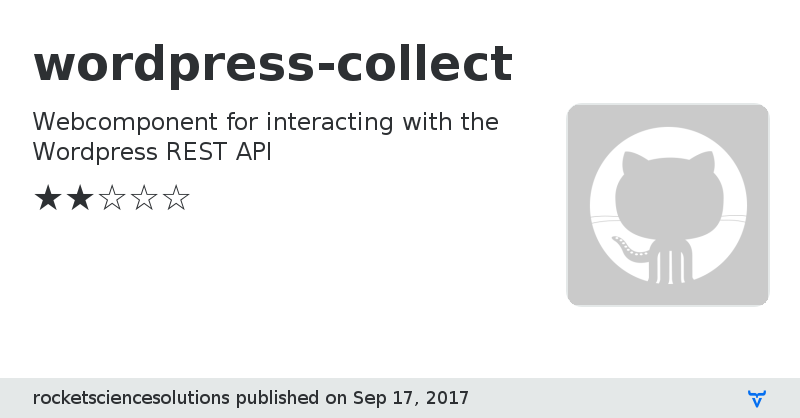wordpress-collect - Vaadin Add-on Directory
Webcomponent for interacting with the Wordpress REST API
**[ This description is mirrored from README.md at [github.com/rocketsciencesolutions/wordpress-collect](https://github.com/rocketsciencesolutions/wordpress-collect/blob/v0.0.2/README.md) on 2018-01-17 ]**
[](https://travis-ci.org/rocketsciencesolutions/wordpress-collect)
[](https://www.webcomponents.org/element/rocketsciencesolutions/wordpress-collect/elements/wordpress-collect)
[](http://standardjs.com)
# \
The `wordpress-collect` element makes it possible to interact with the native [WP REST API](https://developer.wordpress.org/rest-api/reference/).
## Table of Contents
1 [Install the element in your project](#installation)
2 [Usage](#usage)
2.1 [Attribute: base-url - required](#base-url)
2.2 [Attribute: resource - required](#resource)
2.3 [Attribute: id - optional](#id)
2.4 [Attribute: response - required](#response)
2.5 [Attribute: wp-api-url - optional](#wp-api-url)
## 1 Installation ```bash bower install --save wordpress-posts ``` ## 2 Usage ```html
Online Demo2 [Usage](#usage)
2.1 [Attribute: base-url - required](#base-url)
2.2 [Attribute: resource - required](#resource)
2.3 [Attribute: id - optional](#id)
2.4 [Attribute: response - required](#response)
2.5 [Attribute: wp-api-url - optional](#wp-api-url)
## 1 Installation ```bash bower install --save wordpress-posts ``` ## 2 Usage ```html
[[page.title.rendered]]
[[page.content.rendered]]
GitHub Homepage
Documentation
Issue tracker
License
wordpress-collect version 0.0.1
### Dependencies
Polymer/polymer#^2.0.0
* iron-ajax#^2.0.5
wordpress-collect version 0.0.2
### Dependencies
Polymer/polymer#^2.0.0
* iron-ajax#^2.0.5